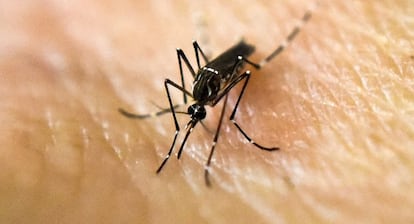Why do mosquitoes bite some people more than others?
Although no one is certain about what scents attract mosquitoes the most, several studies point to a group of molecules

Disease-carrying mosquitoes have killed more people than all the wars in recorded history combined. In fact, statistics indicate that the mosquito is by far the world’s deadliest creature for humans.
Mosquitos caused around 725,000 deaths in 2018 alone. The second leading cause of death for humans that year was other people, responsible for 437,000 deaths. Trailing far behind were the combined deaths caused by snakes, dogs, poisonous snails, crocodiles, hippopotamuses, elephants, lions, wolves and sharks.
This worrisome situation prompted the World Health Assembly in 2017 to approve Global Vector Control Response (GVCR) 2017-2030, a program that provides strategic direction for countries that need to urgently control vectors, especially mosquitoes.
Vector control is essential for mosquito-borne disease prevention and outbreak response. These insects can transmit diseases as diverse as West Nile fever, Zika, dengue, yellow fever, chikungunya, St. Louis encephalitis, lymphatic filariasis, La Crosse encephalitis, Pogosta disease, Oropouche fever, Tahyna virus disease, Rift Valley fever, Semliki Forest virus infection, Sindbis fever, Japanese encephalitis, Ross River virus disease, Barmah Forest virus disease, and malaria, the last of which caused 627,000 deaths in 2020 alone. It’s understandable why people want to know what makes mosquitoes choose to bite one person and not another.
Carbon dioxide and body odor
Male and female mosquitoes can both survive without biting other animals, but females need blood to complete the reproductive cycle. Carbon dioxide (CO₂) was identified as a mosquito attractant almost a century ago. This gas has also been used to trap female mosquitoes seeking to consume blood with the nutrients needed for ovogenesis, or egg generation.
However, there is no evidence to indicate that CO₂ accounts for differential attraction. In other words, carbon dioxide emission levels do not explain why mosquitoes consistently prefer one person over another. So what’s the explanation? There are other physical and chemical cues that attract mosquitos such as heat, water vapor, humidity, visual cues, and most importantly, body odor.
Although the most attractive scents for mosquitoes are not well known, several studies point to molecules such as indole, nonanol, octenol, and lactic acid as prime suspects. A team of researchers led by Matthew DeGennaro of Florida International University (USA) identified a unique odorant receptor, known as ionotropic receptor 8a (IR8a), that enables the Aedes aegypti mosquito to detect lactic acid. This type of mosquito is a known transmitter of dengue, chikungunya, and Zika. When scientists mutated the IR8a receptor on the insect’s antennae, they discovered that the mosquitoes were unable to detect lactic acid and other acidic odors from humans.
Acetophenone, the ‘perfume’ that attracts mosquitoes
Recent research indicates that the dengue and Zika viruses alter the odor of the mice and humans they infect to make them more attractive to mosquitoes. This is an interesting contagion strategy, because it encourages mosquitos to bite the host, extract infected blood, and then transport the virus to another individual. The viruses achieve this by modifying the emission of an aromatic ketone – acetophenone – that is particularly attractive to mosquitoes.
Human and rodent skin normally produces an antimicrobial peptide that controls bacterial populations. However, in mice infected with dengue or Zika, the concentration of this peptide drops, and some bacteria (genus Bacillus) proliferate, triggering the production of acetophenone. Something similar happens in humans: odors collected from the armpits of dengue patients were found to contain more acetophenone than those of healthy people.
Interestingly, this enhanced acetophenone emission can be corrected. Some of the dengue-infected mice were treated with isotretinoin, which led to less acetophenone emission, making the host less attractive to mosquitoes.
Microbes that change odor
This is not the only example of a microorganism manipulating the physiology of mosquitoes and human hosts to enhance transmissibility. For example, people infected with Plasmodium falciparum, the parasite that causes malaria, are more attractive than healthy individuals to Anopheles gambiae mosquitoes, the vector of the disease.
The reason for this is not known, but may be related to Plasmodium falciparum producing an isoprenoid precursor called (E)-4-Hydroxy-3-methyl-but-2-enyl pyrophosphate (HMBPP), which affects the mosquito’s blood-seeking and blood-feeding behaviors, as well as susceptibility to infection. Specifically, HMBPP activates human red blood cells to release more CO₂, aldehydes, and monoterpenes, which combine to attract mosquitos and invite them to “suck our blood.”
Moreover, adding HMBPP to blood samples significantly intensifies attraction of other mosquito species, such as Anopheles coluzzii, Anopheles arabiensis, Aedes aegypti, and some species of the Culex pipiens/Culex torrentium complex.
Understanding the factors involved in making some people more attractive to mosquitos than others will help identify and reduce the risk of transmission of vector-borne infectious diseases.
Tu suscripción se está usando en otro dispositivo
¿Quieres añadir otro usuario a tu suscripción?
Si continúas leyendo en este dispositivo, no se podrá leer en el otro.
FlechaTu suscripción se está usando en otro dispositivo y solo puedes acceder a EL PAÍS desde un dispositivo a la vez.
Si quieres compartir tu cuenta, cambia tu suscripción a la modalidad Premium, así podrás añadir otro usuario. Cada uno accederá con su propia cuenta de email, lo que os permitirá personalizar vuestra experiencia en EL PAÍS.
¿Tienes una suscripción de empresa? Accede aquí para contratar más cuentas.
En el caso de no saber quién está usando tu cuenta, te recomendamos cambiar tu contraseña aquí.
Si decides continuar compartiendo tu cuenta, este mensaje se mostrará en tu dispositivo y en el de la otra persona que está usando tu cuenta de forma indefinida, afectando a tu experiencia de lectura. Puedes consultar aquí los términos y condiciones de la suscripción digital.








































